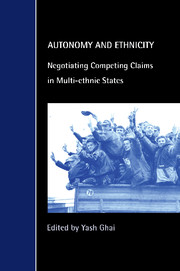Book contents
- Frontmatter
- Contents
- Acknowledgements
- List of Contributors
- 1 Ethnicity and Autonomy: A Framework for Analysis
- Part I Operating Autonomies
- Part II Failed Autonomies
- Part III Seeking Autonomies
- 8 Ethnicity and the New Constitutional Orders of Ethiopia and Eritrea
- 9 The Politics of Federalism and Diversity in Sri Lanka
- 10 Cyprus: From Corporate Autonomy to the Search for Territorial Federalism
- 11 Bougainville and the Dialectics of Ethnicity, Autonomy and Separation
- 12 The Implications of Federalism for Indigenous Australians
- List of Cases
- List of Legislation
- Index
9 - The Politics of Federalism and Diversity in Sri Lanka
Published online by Cambridge University Press: 06 July 2010
- Frontmatter
- Contents
- Acknowledgements
- List of Contributors
- 1 Ethnicity and Autonomy: A Framework for Analysis
- Part I Operating Autonomies
- Part II Failed Autonomies
- Part III Seeking Autonomies
- 8 Ethnicity and the New Constitutional Orders of Ethiopia and Eritrea
- 9 The Politics of Federalism and Diversity in Sri Lanka
- 10 Cyprus: From Corporate Autonomy to the Search for Territorial Federalism
- 11 Bougainville and the Dialectics of Ethnicity, Autonomy and Separation
- 12 The Implications of Federalism for Indigenous Australians
- List of Cases
- List of Legislation
- Index
Summary
Leonard Woolf, the literary critic and publisher, was a colonial civil servant in Ceylon from 1904 to 1911 and served in both Jaffna in the extreme north and Hambantota in the deep south. Many years later, advising the British Labour Party, he argued for a constitutional arrangement which ensured a large measure of devolution, on the Swiss federal model, saying that the canton system had proved ‘extraordinarily successful under circumstances very similar to those in Ceylon, i.e. the coexistence in a single democratic state of communities of very different size, sharply distinguished from one another by race, language and religion’ (Sports 1989:417). As early as 1926, S.W.R.D. Bandaranaike advocated the idea of federalism as a constitutional response to Sri Lanka's diversity. He pointed out that ‘a thousand and one objections could be raised against this system, but when objections were dissipated some form of Federal Government would be the only solution’ (Ceylon Morning Leader, 17 July 1926; see also Tiruchelvam 1992; Uyangoda 1994:97). Despite the foresight of Woolf and Bandaranaike, Sri Lanka's failure to lay down the constitutional foundation of a multi-ethnic society based on equality, ethnic pluralism and the sharing of power has generated ethnic fratricide and political violence (Tambiah 1986; Wilson 1988).
Sri Lanka is a multi-ethnic and plural society consisting of two linguistic groups: the Sinhalese (mainly Buddhists) and Tamils (mainly Hindus), and the Muslim community (mainly Tamil-speaking, but with a substantial section that is bilingual).
- Type
- Chapter
- Information
- Autonomy and EthnicityNegotiating Competing Claims in Multi-Ethnic States, pp. 197 - 218Publisher: Cambridge University PressPrint publication year: 2000
- 6
- Cited by

